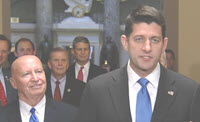House Republican leaders aim to vote on “Tax Reform 2.0” legislation in September, followed by a tax technical corrections bill after the November mid-term elections.
 |
House Speaker Paul Ryan (R-WI), right, and House Ways and Means Committee Chairman Kevin Brady (R-TX), left, pledged action on Tax Reform 2.0. Ryan said taxwriters are compiling a list of "glitches and issues" in the new tax law that could be in a technical corrections bill. |
- House Ways and Means Committee Chairman Kevin Brady (R-TX) on Tuesday said a second round of tax cuts would include permanently extending individual tax cuts passed last year in the Tax Cuts and Jobs Act. Twenty-three provisions in the law relating to individual income taxes are currently scheduled to expire at the end of 2025. (Tax Foundation, January 18)
- During the July 17 meeting with President Trump and other members of his committee, Brady said, "We anticipate the House voting on this in September and the Senate setting a timetable as well." After the meeting, Brady added, "We talked about timing and the importance of this. ... We're very well aligned with the White House on 2.0." In a televised interview on Wednesday morning, Chairman Brady expanded on his vision for the next major tax bill, which he said would create 1.5 million additional jobs. (Fox Business, July 18)
- Such a bill likely would face significant challenges in the Senate, where it would need Democratic support to pass. Senate Finance Committee Chairman Orrin Hatch (R-UT) supports making the tax cuts permanent and “will continue to work with his colleagues to find a viable path and timing to achieve this goal,” according to a spokeswoman. (Wall Street Journal, July 19)
- House Speaker Paul Ryan (R-WI) last week also pledged action on Tax Reform 2.0 and added that a technical corrections tax bill would be introduced after the mid-term elections. Ryan said taxwriters are compiling a list of "glitches and issues" in the new tax law that could be corrected in the bill. Chairman Brady also confirmed the timeline last week, stating, “We’re continuing to develop the technical corrections. It’s always been assumed that we would want to see how Treasury lays out its rules, from everything from pass-throughs to international.” (CQ, July 12 and Bloomberg Tax, July 13)
Among the technical corrections needed is a drafting mistake that added nearly a quarter-century to the depreciation life for qualified improvement property that has negatively affected commercial real estate development. Roundtable SVP and Counsel Ryan McCormick explained at a recent NYU tax conference that while Congress intended for qualified improvement property to receive bonus depreciation — setting the recovery period at 15 years — a drafting error put the recovery period at 39 years. “In addition to conflicting with the clear legislative intent, this result is ... antithetical to the basic direction of the underlying bill,” McCormick said. (Tax Notes, July 2 and Wall Street Journal, July 10 – "Legislative Mistake Causes Some Companies to Postpone Renovations")
